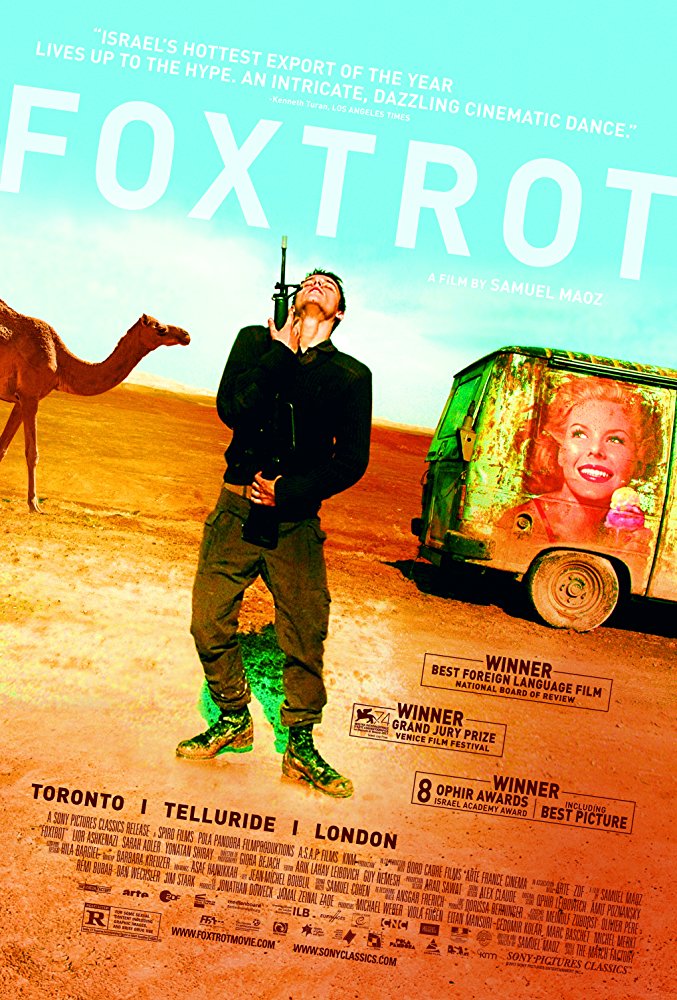THE AISLE SEAT - by Mike McGranaghan
"FOXTROT"

It's extremely difficult to make a movie about a “thing” if you don't tell the audience what that “thing” is. The Israeli drama Foxtrot is about as perfect an example of that as you're likely to find. Although probably deserving of some points for risk-taking, the film undermines its own drama by waiting until the final seconds to inform the audience of what we're supposed to have spent the last 110 minutes caring about.
Writer/director Samuel Moaz divides the story into three parts. In the first, Michael and Daphna Feldmann (Lior Ashkenazi and Sarah Adler) are informed that their soldier son, Jonathan, has been killed at his remote military post. We watch them process their grief for about half an hour, at which time they receive some shocking, unexpected news. Michael doesn't know what to make of this development and demands to lay eyes on his son.
From there, the story flashes back to the checkpoint where Jonathan (Yonaton Shiray) serves. There are long, generally pointless scenes of him talking with his fellow soldiers, hanging out, and occasionally stopping a car that tries to pass through. After at least half an hour of this, the story jumps again – this time back to Michael and Daphna. To say what this third section is about would constitute a spoiler, but it's the “thing” referenced above, and we observe the ramifications of that thing. Right before the movie's fade to black, we finally get to see what happened.
Foxtrot clearly has big issues on its mind, including grief, guilt, and the continual fear loved ones of soldiers live with. To its immense discredit, though, the storytelling approach is all wrong. During the first act, Michael attempts to process his son's death in the face of the bureaucratic funeral arrangements necessary because he was in the military. Just as we're getting emotionally invested in that – as well as his reaction to the shocking news he receives -- Moaz cuts away to the story of Jonathan at the outpost. That abruptly halts the dramatic momentum, essentially forcing us to start from scratch in terms of figuring out what's going on and learning who new characters are. The whole point of the middle section is that life there is tedious, and the movie intentionally replicates that, allowing apathy to creep in.
Going back to Michael and Daphna for the final section proves jarring once again. The second time we see them is much later, and they are not quite in the same situation as they were at the beginning. At this point, we still don't know what specifically happened, so watching how they are impacted by it doesn't carry a whole lot of weight. The last minute finally visualizes the thing they've been talking about, and which is central to Foxtrot. By that point, it's way too late.
There's no doubt the film has been made with artistry and ambition. That said, the disjointed manner in which the story is told ends up being distracting rather than engrossing. Fractured time narratives can work, as Pulp Fiction illustrated so magnificently, when structured so that disparate elements still feel connected. Foxtrot doesn't entirely accomplish that. It makes ill-timed narrative leaps that kill any urgency inherent in the subject matter.
What should be a powerful tale is instead a laborious misfire.
(![]() 1/2 out of four)
1/2 out of four)
Foxtrot is rated R for some sexual content including graphic images, and brief drug use. The running time is 1 hour and 52 minutes.
Buy a copy of my book, "Straight-Up Blatant: Musings From The Aisle Seat," on sale now at Lulu.com! Paperback and Kindle editions also available at Amazon.com!


